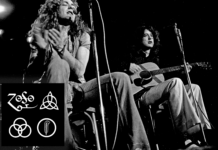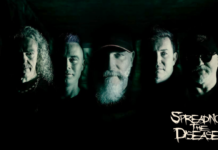Hailing from Lexington, Kentucky, Emarosa formed in 2006 and were initially a post-hardcore band. Over time the band has shredded their metal/rock origins and have progressively moved into a more pop-focused direction. Their last album Peach Club still had the deep roots of rock music despite its huge pop overtones, however, with their latest album Sting, they have left behind in the rearview mirror any notion that they are a rock band and heading along on the highway in a red corvette to the fluorescent destination of pop music.
Everything from the production, lyrics, musical arrangement and imagery of the album is an unashamed nod to all that is glorious about Synthwave. A genre of pop music that has gained massive popularity in recent times and Emarosa have fully gripped a hold of the vapour trails of this nostalgia machine.
Sting is short and punchy, 10 songs in 34 minutes, there is no fat on this album. Each song immediately hits into the melody and to me has the ambition of being the greatest hit of the best 80’s pop group that never was. Emarosa have tried to create the auditory equivalent of driving in a convertible along a coastal road, with the sea crashing on a sandy white beach while the neon glow of a city to the right reflects upon the water.
However, it stalls at the traffic lights, instead of leaving the competition in its dust. More often than not, the melody arrives and from then on there is not enough progression in the song structure to really allow them to stand out and be the hooks they deserve to be. For the majority of the album after the first verse-chorus cycle, you have heard all, there is to be offered in the song and the album becomes a blur. This is very frustrating, because on songs like ‘Woman’ where Emarosa slightly change up the formula (with a shock horror mid-break) then Emarosa shows their credentials, and they show their ability to write captivating pop music.
With the exception of the song ‘INLA’ which has a short but very sweet lead, the guitar lines do not have the time or space to really open up any song to epic proportions, as Prince did so effortlessly all through the 80s. Or when the saxophone passages arrive they depart without having really had enough time to elevate the further. It is almost like these moments were shoehorned into the album because that is what is expected from a Synthwave album, rather than having the real thought of what those moments do for songs.
This is one of the few albums where I think that by allowing the songs to be longer, those moments would’ve had sufficient time to be more expressive and thus the album would’ve been far more memorable for it. It is not a poor album at all, when listening to Sting I did enjoy it and it is an unashamed love letter to the 80s.



















